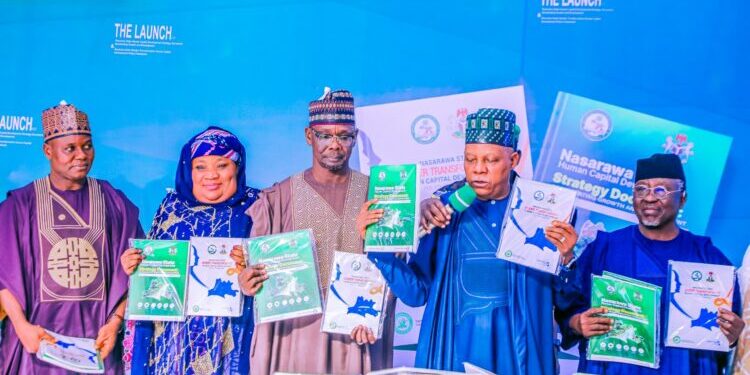Vice President Kashim Shettima on Saturday launched the Nasarawa State Human Capital Development Strategy Document and the Gender Transformative Policy Framework, calling for increased investment in the skills and knowledge development of Nigerians, particularly the youth.
The documents, developed by the Nasarawa State Human Capital Development Agency, aim to enhance the welfare and livelihoods of the people while promoting gender equity in the state.
The event marked the first official engagement on human capital development for the Vice President, who also chairs the National Human Capital Development Agenda.
Shettima expressed confidence that significant progress in human capital development can be achieved through collective commitment and collaboration.
He emphasized the federal government’s dedication to equipping youth with employable skills and empowering them to compete in global markets.
“These are not mere goals. They are the promises embedded in our Human Capital Development Programme,” Shettima said.
He commended Nasarawa State for leading in the implementation of the national human capital development agenda and noted the success achieved so far.
“Today’s launch of the Nasarawa State Human Capital Development Strategy Document and Gender Transformative Policy Framework is evidence of Nasarawa State’s leadership and vision under His Excellency, Governor Abdullahi Sule,” Shettima said.
“However, no government can function in isolation. The progress we’ve made in this program is a result of shared commitment to collaboration and partnership.”
Governor Abdullahi Sule reiterated the state’s commitment to achieving measurable and sustainable results through the policies launched. He highlighted the priority areas of education, healthcare, infrastructure, and gender inclusion, with targets set for 2030.
“The Nasarawa State Human Capital Development Strategy Document—Accelerating Growth and Development 2024-2030—is an actionable roadmap guiding interventions in key areas like education, healthcare, and economic empowerment,” Sule stated.
“The Gender Transformative Human Capital Development Framework is equally crucial, as gender equity is essential for sustainable development.”
Habiba Balarabe Suleiman, Director-General of the Nasarawa State Human Capital Development Agency, described the launch as a significant milestone.
She noted that the state has streamlined processes to address gender disparities and promote skills development. Suleiman called on stakeholders to align with the agency’s agenda to accelerate development and help citizens realize their full potential.











